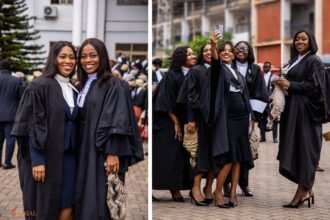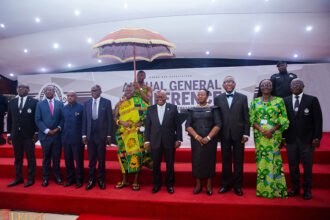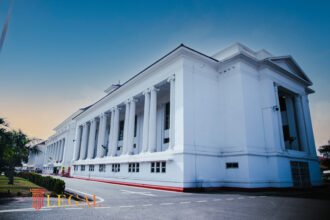

April 26, 2024
The Apex Court of Ghana this morning upheld action by Kwame Baffoe (a private citizen) seeking the enforcement and original jurisdiction of the Supreme Court under Articles 2(1) and 130(1) of the Constitution, 1992.
On the 6th of January 2020, the Parliament of Ghana determined and approved payment of salaries to the spouses of the President and Vice President as though they were article 71 office holders.
The approval by Parliament follows the recommendation of the Presidential Committee on Emoluments – the Ntiamoa Badu Committee.
The Ntiamoa Badu Committee formed by President Akuffo Addo was to make recommendations in respect of emoluments and other privileges for article 71 Office Holders as specified under the Constitution and to examine any other relevant matter which the Committee considers appropriate to its work.
As part of their recommendations, the Committee observed that neither the Constitution nor any legislation has stipulated that spouses of the President and Vice President be paid salaries and allowances, nonetheless, they were being paid such. The committee then recommended that these payments be regularised and subsumed under the privileges of the President and Vice President.
The plaintiff invoking the enforcement and original jurisdiction of the Supreme Court under articles 2(1) and 130(1) of the 1992 Constitution, sought for a declaration from the Supreme Court that the said recommendation of the Ntiamoa Badu Committee was inconsistent with the Constitution.
The Plaintiff submitted that since the positions of the spouses of the President and Vice President are not captured under article 71, they do not merit the payment of salaries and allowances from the Consolidated Fund. Therefore, Parliament contravenes article 71 (2) of the 1992 Constitution by approving the committee’s recommendation. Citing the case of Tommy Thompson Books Ltd v. The Republic [1995-96] 1 GLR 227, in which the Supreme Court held that the First Lady of Ghana is not a public officer, the plaintiff argued further that to include the spouses of the President and Vice president under article 71 was tantamount to recognizing them as public office holders which they are not.
The Attorney General implored the court to hold, on a liberal and purposive interpretation of article 71, this approved payments as part of the privileges of the President and Vice President to be consistent with the intention of the provision of article 71 of the 1992 Constitution.
The Supreme Court in determining the matter opined that the framers of the Constitution intended for the scope of article 71 to be limited to public office holders identified in the provision; that the emoluments of the public officers listed in article 71 reveals the purposive direction of article 71 as deliberately exclusionary, and proceeded to hold thus:
“…it is our firm opinion that the act of Parliament approving the recommendation to directly pay the spouses of the President and Vice President salaries that were benchmarked to the salaries of Ministers and Members of Parliament, as part of the emoluments of the President and Vice President, is an act that is violently inconsistent with the clear directions, intentions and purposes of article 71. It also contravenes the spirit and letter of article 71.”
Naiza Issifu, a third year student at Mount University Faculty of law contributed to research.











